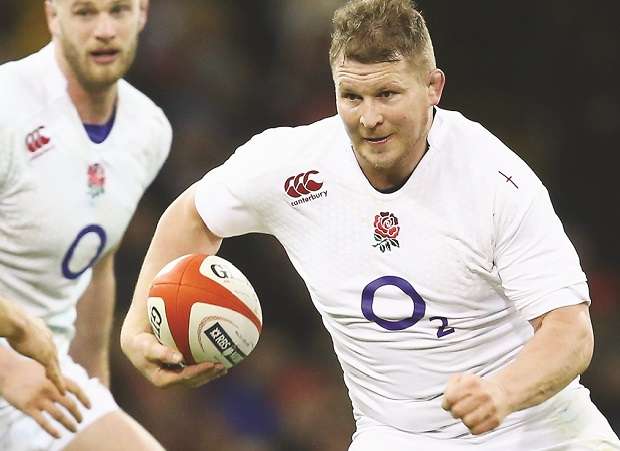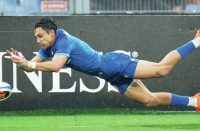
First there was the pre-Christmas leak of his preference for Hartley but then came a significant change of position at the England squad announcement when Jones suddenly insisted he wouldn’t pick his skipper until he had settled his starting XV for Scotland.
So, with Hartley’s coronation, are we also to assume that as England go into camp this week the XV is already set in stone and that absolutely no places are up for grabs? Which is an interesting dynamic to say the least.
Regardless of all that, does the captaincy even matter in these days of meticulous planning and instructions comically being relayed on by the army of “water boys” who seem to invade the pitch every five minutes?
Captaincy in rugby is certainly nowhere near as important as in cricket with few of the minute by minute tactical nuances and the opportunity to manufacture something from nothing through your instinctive nous and genius.
But it still counts. The biggest criticism of Chris Robshaw‘s captaincy centred around crucial decisions on whether to kick at goal – or not – against Australia and South Africa in the autumn of 2012 and Wales at the World Cup. You can debate the pros and cons to this day but they were huge moments when time suddenly stood still and everybody looked to the skipper.
The skipper is also important in that he has to be in tune with the coach, they can’t be at odds. One of the reasons, surely, that Stuart Lancaster went for Robshaw is that nobody could doubt the latter’s honest, integrity and reliability on and off the pitch. Lancaster was appointed with a licence to ‘clean up’ England’s act after the 2011 World Cup and Robshaw personified that.
Eddie Jones’ soulmate and representative on the field is always likely to be an edgier individual and Hartley certainly scores highly in that respect but there is also the pressing need for the captain to be an automatic selection. Which is where Hartley’s selection is more contentious because, on current fitness and form, Jamie George is the clear leader at hooker.
Hartley has played just a handful of games in the last eight months and endured injury and concussion problems. He will be fresh and he may well hit his stride very soon but his selection, in a number of respects, is the first big gamble of the Jones regime. Scotland at Murrayfield in a Six Nations opener is not the ideal venue to be playing your way back into decent nick.
And does he fit the bill long term? Is he the man Jones sees taking England through to RWC2019 or is he a short term appointment until somebody else emerges? Perhaps a look at England’s most successful – and unsuccessful – captains can give us a clue as to what is required or appropriate. I have prepared a table on England’s captains with the cut-off point being that they be in charge of ten or more Tests to stop it being too random.
First in pure statistics what do the results tell us? Well never underestimate the importance of fate and good fortune. As Bonaparte once said: “I know he is a good general but is he lucky?” There are some harsh stats there that don’t quite reflect the reality.
Second, England don’t honour WJA Davies nearly enough, a fly-half who starred in four Grand Slam teams, never lost a Championship game and was undebated as captain. Why isn’t this man a legend of the English game?
Most importantly, longevity can really work if you get the right man, either by design or good fortune. Martin Johnson’s record of 34 wins in 39 games is extraordinary given how many of those were against top Southern Hemisphere opposition while Will Carling’s record – 44 wins out of 59 – is also off the Richter scale.
Both were identified by entirely different methods. Carling, 22, was a five-Test novice who thought he was being dropped from the squad when Geoff Cooke phoned to offer the captaincy in October 1988.
Carling’s appointment was a gut instinct punt by Cooke who wanted a new kid on the block receptive to new training methods, who understood management speak from his Army leadership training and who embraced extra media responsibilities.
Perhaps most importantly of all he wasn’t a member of that group tainted by underachievement from about 1982 onwards. That’s always the argument for a bolt from the blue appointment. If Jones had wanted to go that route it would have been George or, perhaps, Maro Itoje.
Johnson, meanwhile, was very different. He wasn’t Clive Woodward’s first choice by any means. That was Lawrence Dallaglio despite Johnson leading the Lions to victory in South Africa in 1997. Dallaglio was articulate, receptive to new ideas and a proven leader among his younger age group – Hill, Dawson, Greenwood, Catt, Lewsey, Healey – which Woodward envisaged would take England forward.
And it might well have remained that way had it not been for the News Of The World affair which saw Dallaglio stripped of the captaincy. Dallaglio had just come through a difficult first couple of seasons and England should probably have won a Grand Slam in 1999 but for a hugely contentious penalty against Tim Rodber for a perfectly legal tackle at Wembley against Wales.
He was getting there.
Woodward, though, was forced to change tack and went for the talismanic first name on the teamsheet approach – for England that man was always Johnno – and what an inspired choice he ultimately was. Woodward didn’t exactly stumble on Johnno as England captain but fate played a bit part.
So there is definitely more than one way to skin a cat. But what else can we glean from the statistics? Well then you come to the difficult area of perception. You can be a great captain despite everything.
Bill Beaumont has the deserved reputation of being an exceptional England captain but his record is comparatively modest when compared with some, especially given the players England had available. He did, though, deliver the first Grand Slam in 23 years and that, of course, is what he will always be remembered for.
Contemporaries of Dickie Jeeps cannot talk highly enough of him as a captain yet in the cold light of day his record is only middling, ditto John Pullin although, of course, two of his six wins were South Africa and New Zealand away which are worth double in my book, if not more, given that no other home nation side have ever won in either country.
Phil Vickery’s record – during a really difficult transitional phase – is better than I remember and perhaps we didn’t give him enough credit.
Vickery was low key, under the radar, a player’s man through and through. Looking back he was a good general but not particularly ‘lucky’ with the hand he was dealt.
Hartley may be an inspired choice but, above all else, he will need his share of luck.


























